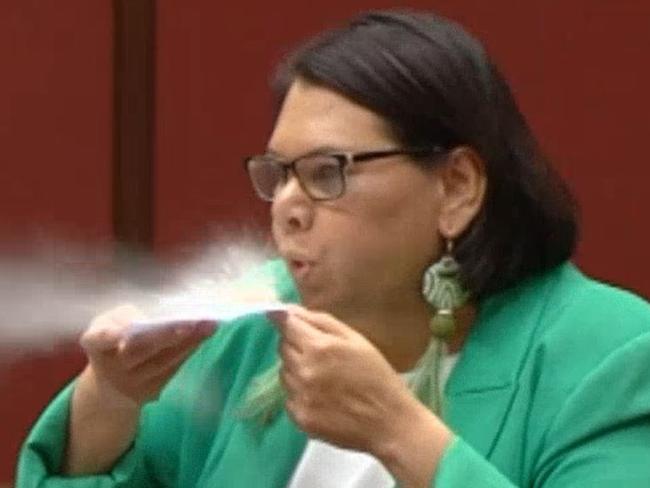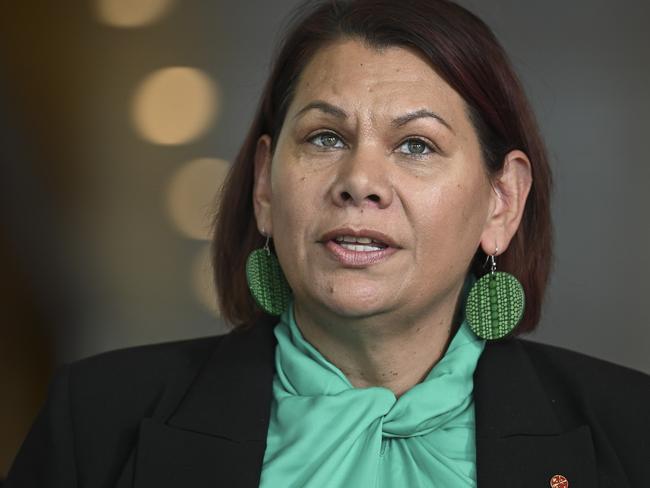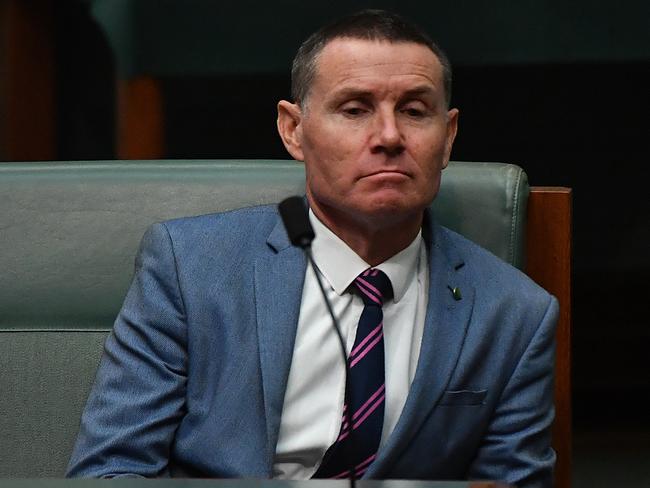Vikki Campion: Say what you like, the Senate rules don’t apply to all
The Senate is supposed to belong to the Australian people, not to one Senator’s spiritual beliefs, writes Vikki Campion. So why wasn’t Dorinda Cox called out?
Opinion
Don't miss out on the headlines from Opinion. Followed categories will be added to My News.
If a Catholic senator swung incense around the Senate chamber and anointed it with holy oil as part of a cleansing ceremony during a debate, there would be bans, clean-up bills and, at minimum, a disorderly conduct ruling.
Yet Greens Senator Dorinda Cox, newest member of an Albanese stack out of the Joint Standing Committee on Aboriginal and Torres Strait Islander Affairs, blew an undisclosed white powder over the leather upholstery of what is known as “the most exclusive club in Australia” this week with zero repercussions.
The Greens have become aware of their worth in the Senate, with Senator Cox’s cleansing ceremony in response to what she called a “disgusting” conversation about an inquiry into Aboriginal land councils.

“Noonakoort moort kwonbarr. Djinying nidjar mungart Boorah. Koort boodjar nidja ngaarl boodjar. Kaarl boodjar. Kaarl boodjar,” she said, with no interpreter offered, opening folded white paper and blowing powder over the lectern.
For every other Senator, there are rules of conduct – about when you can walk, stand, and shut up.
Members can’t drink coffee in the chamber. Eating is ruled as disorderly, as is holding signs or slogans.
When former Liberal MP Andrew Lamming tipped oil on his hands he had to pay cleaning costs and copped a 24-hour ban. Yet the Greens get a licence to do whatever they like when it comes to Indigenous Australia.
The Senate is supposed to belong to the Australian people, not to one Senator’s spiritual beliefs.
If it were any other religion, they would be asked to leave and go to the prayer room – which now requires an ID-verified pass for lift access.
Senators in the chamber still don’t know what was being blown at them.
And if they had asked her to stop, would they have been branded racist?

This is Cox saying this is not Australia’s chamber. This is the Greens’ chamber – and the Senate is letting her get away with it.
While Prime Minister Anthony Albanese has been running around telling everyone the parliament will decide on the Voice detail, suddenly, the key Indigenous legislative committee has had its numbers boosted – but only with extra Labor and Greens members and senators.
NEW LEVEL OF CRAZINESS
After the Voice legislation goes through the lower house, it will go through the Senate, which has hit a new level of craziness.
Twice now, Labor has united with the Greens and Climate 200-backed Senator David Pocock to quash a Senate inquiry into Aboriginal Land Councils brought on by Indigenous Senators Jacinta Nampijinpa Price, Kerrynne Liddle and Lidia Thorpe following mounting allegations of corruption and failing to represent traditional owners accurately.
And if it is referred to committee at the Senate, the best the Coalition can hope for is a dissenting report, on a panel where they are outnumbered eight to three.
Parliament will not decide the details of the Voice. One side will – Labor, Greens and Teals.
Of 124 bills assented so far, Labor has won 124. So how will the Voice be any different?
The only people who can have an effect on the Voice are the Australian people, which is why they get a vote.

And how is that going?
People who registered for a postal vote on September 11 have been told to allow three weeks to get the ballot in the post. This is inexcusable.
We have had political stalling tactics compounded by bureaucratic stalling, leading to certain people living in remote areas being denied a say. First, the government wouldn’t tell us the day of the referendum or the wording and even tried to stop the funding to print the yes or no case.
And now the Australian Electoral Commission and Australia Post can’t get it to us within three weeks?
In a federal election, the AEC has 151 electorates with thousands of candidates and senate papers, as long as a toilet roll, different in each state, printed and sent to homes in 33 days.
If there ever were a ballot the electoral commission could unload on the work experience kid, it has to be the one where the paper has two boxes and is identical in every seat.
Yet, for some unknown reason they need two months to organise the machinery for the Voice?
The AEC told one regional man who applied for a postal ballot on Monday not to expect it in the mailbox until October 2 – by which time he would be in the Pacific, and his only option to vote would be a very long swim to an embassy.
In their defence the AEC say they have printed ballot papers but cannot distribute them until roll integrity checks have occurred on postal vote applications, which must happen after the close of rolls.
Still, these delays indicate an ambivalence from the government.
It suggests that sometimes, we value your right to vote, and sometimes we prefer that you didn’t – just like sometimes we care about what Aboriginal voices say, except if they are conservative.
In 2016, Labor banned Bess Nungarrayi Price, a Country Liberal member, from speaking her first language, Warlpiri, in the Northern Territory Assembly without the explicit permission of the Speaker.
Her electorate spoke Warlpiri as their first language, yet the Labor government ruled it “offensive” if it could not be understood.
As long as you are speaking the language of the left, it doesn’t matter what dialect it is.





